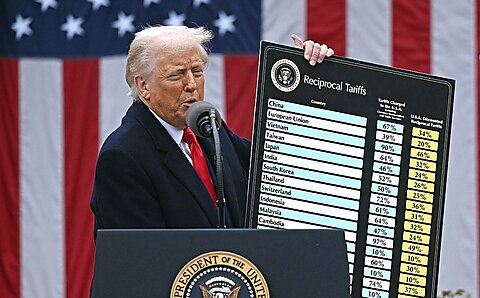Where does one begin?
Well, in no particular order, and certainly not a complete listing, here are five absurd aspects of President Trump’s “Liberation Day” tax hike on American consumers and businesses. And, yes, the entire situation itself is absurd.
Penguins Better Stop “Ripping Us Off”
The Heard and McDonald Islands are remote volcanic islands in the southern Indian Ocean “containing outstanding examples of biological and physical processes continuing in an environment essentially undisturbed by humans.” The president of the United States just imposed a 10 percent tariff on islands without human beings or economic activity. Maybe the White House is moving preemptively to discourage the Chinese from setting up export-oriented manufacturing facilities amongst the elephant seals and grey-headed albatrosses.
Brazil Nuts
Colin Grabow notes that Brazil’s trade-weighted average tariff is 7.3 percent, while Singapore’s is 0 percent. Trump imposed a 10 percent tariff on goods from both. The White House calls the tariffs “reciprocal,” but a reciprocal tariff is supposed to match another country’s tariff. Moreover, the US had a traded goods surplus with Brazil in 2024. According to Trump’s logic, the US is ripping off Brazil—and it still got hit with a tariff.
Stand with Israel
Since the 1980s, most US goods exported to Israel have been entering largely tax-free. On Tuesday (Liberation Day Eve), Israel removed the remaining taxes on goods imported from the US. One day later, Trump imposed a 17 percent tariff on Israel. Iran, which he recently threatened with a “bombing the likes of which they have never seen before,” got 10 percent.
Pass the Vodka
Of the 180 countries hit with tariffs, Russia wasn’t one. Treasury Secretary Scott Bessent said Russia was omitted because sanctions resulting from the war in Ukraine had already essentially shut down trade between the two countries. Although Russia was joined by the other three “Column 2” countries (Belarus, North Korea, and Cuba) in not making the list, the omission demonstrates the severe lack of thought behind the tariffing. In 2024, the US had a traded goods deficit with Russia (that’s, again, “ripping us off,” according to Trump). While overall trade with Russia is small, the $2.5 billion trade deficit was more significant than the $3.4 million deficit with tiny St. Pierre and Miquelon, which got tagged with a tariff of 50 percent.
Not So Intimidating Math
The Office of the United States Trade Representative released an explanation for how the “reciprocal” tariffs were calculated. The average person looking at it would likely be intimidated by the formula alone. But what may have looked intimidating was actually rather simple, as the following image shows.
While these items may offer a chuckle, there’s nothing funny about the president of the United States having the power to blow up the global economy just because he doesn’t understand how trade works.
Speaking of not funny:

